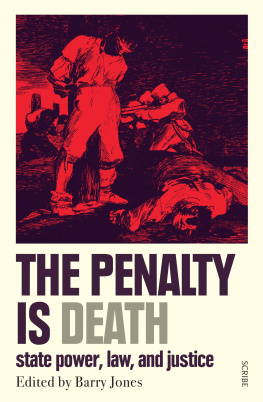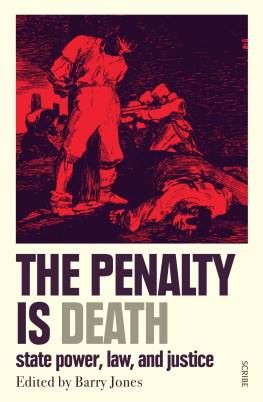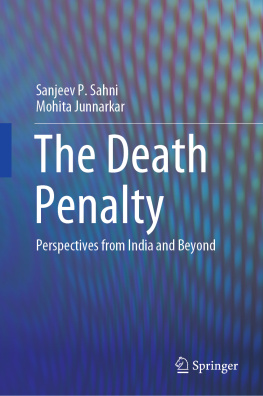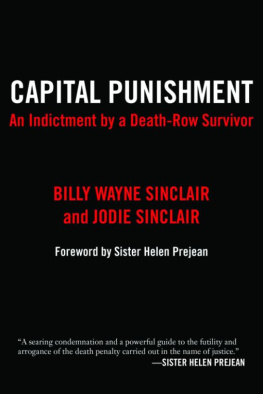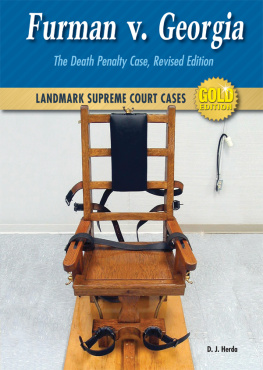The Death of Punishment
The Death of Punishment
Searching for Justice among the Worst of the Worst
Robert Blecker


THE DEATH OF PUNISHMENT
Copyright Robert Blecker, 2013.
All rights reserved.
First published in 2013 by PALGRAVE MACMILLAN in the United Statesa division of St. Martins Press LLC, 175 Fifth Avenue, New York, NY 10010.
Where this book is distributed in English in the UK, Europe and the rest of the world, this is by Palgrave Macmillan, a division of Macmillan Publishers Limited, registered in England, company number 785998, of Houndmills, Basingstoke, Hampshire RG21 6XS.
Palgrave Macmillan is the global academic imprint of the above companies and has companies and representatives throughout the world.
Palgrave and Macmillan are registered trademarks in the United States, the United Kingdom, Europe and other countries.
ISBN 978-1-137-27856-2
Library of Congress Cataloging-in-Publication Data
Blecker, Robert.
The death of punishment / by Robert Blecker.
pages cm
Includes bibliographical references and index.
1. Punishment. 2. Criminal justice, Administration of. I. Title.
K5101.B54 2013
364.6dc23
2013014703
A catalogue record of the book is available from the British Library.
Design by Letra Libre, Inc.
First edition: November 2013
10 9 8 7 6 5 4 3 2 1
Printed in the United States of America.
Contents
Appendix B: A Model Death Penalty (Permanent
Punitive Segregation) Statute
Part I
Man the Measure
Killing the Wrong People
It is easy to get angryanyone can do that...
but to feel or act towards the right person to the right extent at the right time
for the right reason in the right waythat is not easy
Aristotle, Ethics
As a small child, I knew that Nazis were evil and Adolf Hitler deserved to die. My mother staunchly opposed capital punishment, but she made an exception for Hitler. I was five when controversy flared in our house as the United States executed Julius and Ethel Rosenberg, accused Soviet spies. My ultraliberal mother believed the Rosenbergs innocent and insisted they were killed because they were Jews. My father, always sober and rational, taught me that any citizen who gave or even tried to give Joseph Stalin the atom bomb deserved to die.
In elementary school, kids would pull legs off spiders and laugh as the creatures struggled. I once pulled two limbs from a daddy longlegs. Then I thought about it from the spiders point of view. I felt sick and tried to make it up to this creature Id crippled by leaving dead bugs for him to eat.
But Leech Rock was different.
At summer camp, wed come in after swimming in the lake, bleeding, slimy leeches still clinging to us. You couldnt rip them off without losing your skin too. So we flicked them off with a lit match. The animals fell, helpless at our feet. Now what to do? We certainly wouldnt throw them back to attack us again. So we burned them in a ritual at Leech Rock. After all, unprovoked, they had shed our blood. It never occurred to us they were just being leeches. But then, too, maybe by killing them, we were just being human.
During the Cold War of the 1950s, the Soviets killed political dissenters and prepared to destroy the United States. I learned in school that tyrants have always killed dissenters. But never here. I loved the United States, and in fourth grade I wrote patriotic poetry.
As I grew up, freedom became a big issue for me. I refused to keep my parakeet Tippy locked in a cage; he had a right to fly around the room whenever he wanted. My mother threatened to abandon my room to filth. I took her dare. Amanda, our black housekeeper, hated the dirt and scolded me for letting the bird make a mess. But when I explained why, Amanda snuck into my room to clean droppings from my shelves. My parents detested racism and racists. In Mississippi in 1955, the Klan murdered Emmett Till, a 14-year-old black boy, for flirting with a white woman. I wasnt focused on the details, but I remember how upset they were when an all-white jury in Mississippi acquitted young Emmetts killers.
My parents also told me the story of Leo Frank. How in 1913, someone murdered young Mary Phagan in the basement of an Atlanta pencil factory. An ambitious prosecutor pressured witnesses and convinced a jury to convict Frank, the prominent Jewish factory superintendent. The real killera janitor therecooperated with the prosecution. Franks lawyers desperately fought to postpone his execution date while the judge who sentenced Frank to die admitted serious doubts about his guilt. Even the real killers lawyer urged the governor to spare Franks life. On his last day in office, the Georgia governor commuted Franks death sentence, then fled the state with his family.; his prosecutor, Hugh Dorsey, went on to become governor.
So I knew early on that prejudice stained the system; trials did not guarantee justice. The guilty might walk free while innocents were wrongly accused, falsely condemned, and killed. Those in power would make it murder or make it all right with a wink. And yet I still felt certain that Hitler and the racists who killed Emmett Till deserved to die.
Then came that day in eighth grade when I discovered Abraham Lincoln did not free the slaves. I idolized Lincoln and carried around Carl Sandbergs multivolume biography.report to the class exactly which slaves Lincoln in fact freed. Of course it turns out that the Great Emancipator freed exactly no one he could. Slaves living in the Confederacy were now free to rebel and die in the attempt. But everywhere the Union Army controlledin Maryland, for examplethe commander in chief left all slaves in bondage.
Lincoln fell, and then came God. Reading the Old Testament in Bible study class revealed a divine support for genocide A God who let the Holocaust happen. And when I challenged my Sunday school teachers, they could only insist, No man can comprehend His ways, while they had no problem preaching against the death penalty, although the Bible clearly called for it.
First slavery, now segregation, tore America apart. I grew up looking down on the South. How could segregation be the law? I hated Southern sheriffs with attack dogs tearing up freedom fighters. Civil rights crusaders became my new heroes. The Soviets might be ahead of us in the space race, but Martin Luther King Jr. stirred me, while John and Bobby Kennedy glamorously and gloriously forced racial integration.
November 22, 1963, eleventh-grade social studies, seventh period. Studying the American Civil War again, only this time I knew that Lincoln hadnt freed the slaves. So no big surprises. The principals metallic voice crackled on the intercom: President Kennedy had just been assassinated. Then Jack Ruby assassinated Kennedys assassin, Lee Harvey Oswald, on TV! What was happening?
Off I went at 17 to Tufts University, loving my country, still grieving Kennedy, and believing in the death penalty. In 1965, we college freshmen fought to keep our door nearly closed with a woman in our dormitory room, while the women fought for the right to wear pants on campus. By our senior year in 1969, we had occupied buildings in protest and shut down the school. In addition to sex, drugs, and the Beatles, the war in Vietnam consumed us. And not only because we might be drafted to fight and die. Our political science professors taught us that Ho Chi Minh strove for a more just society. An admirer of the United States, although a Communist, Ho had modeled Vietnams Constitution on ours. Only he wanted Vietnamand not American big businessto control his countrys natural resources. So President Eisenhower canceled promised elections because, as he explained, If free elections had been held, Ho Chi Minh would have won 80 percent of the vote.
Next page

